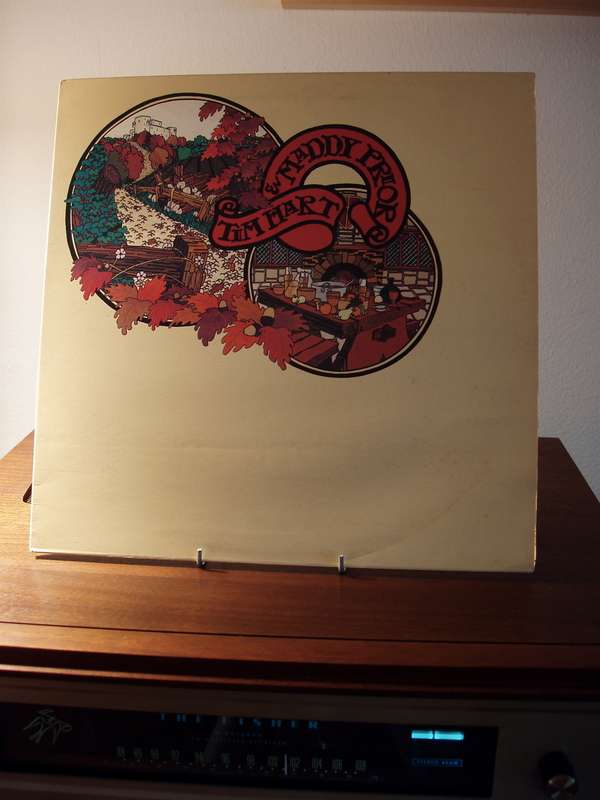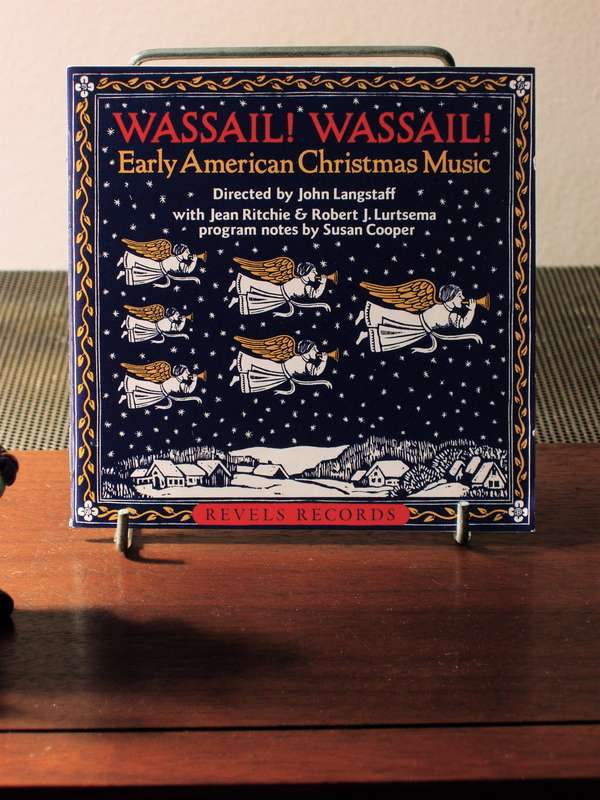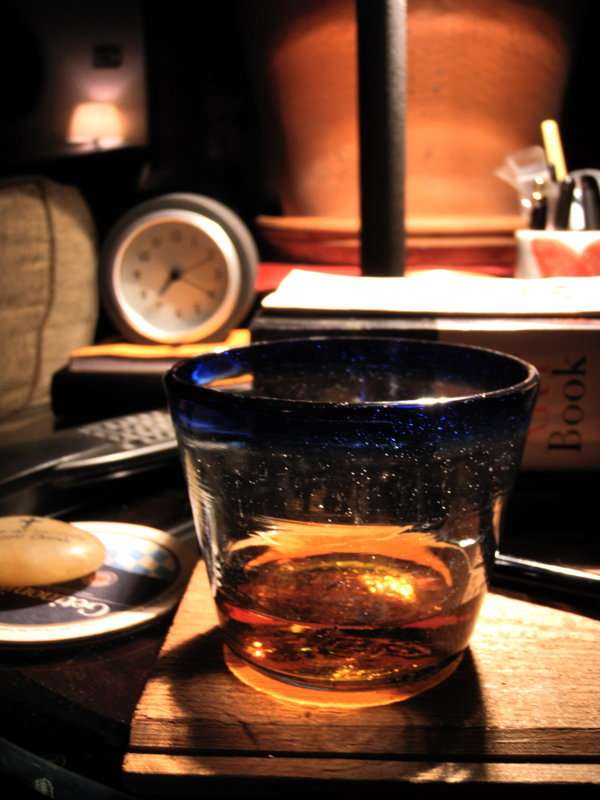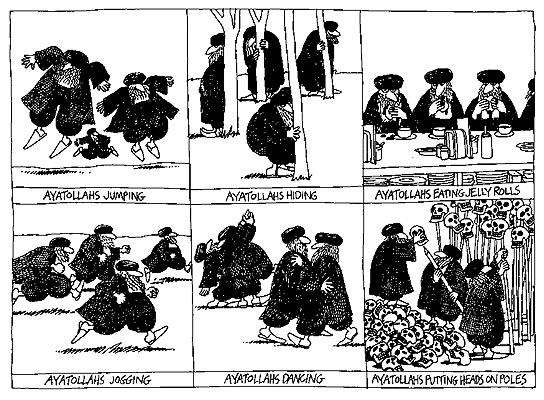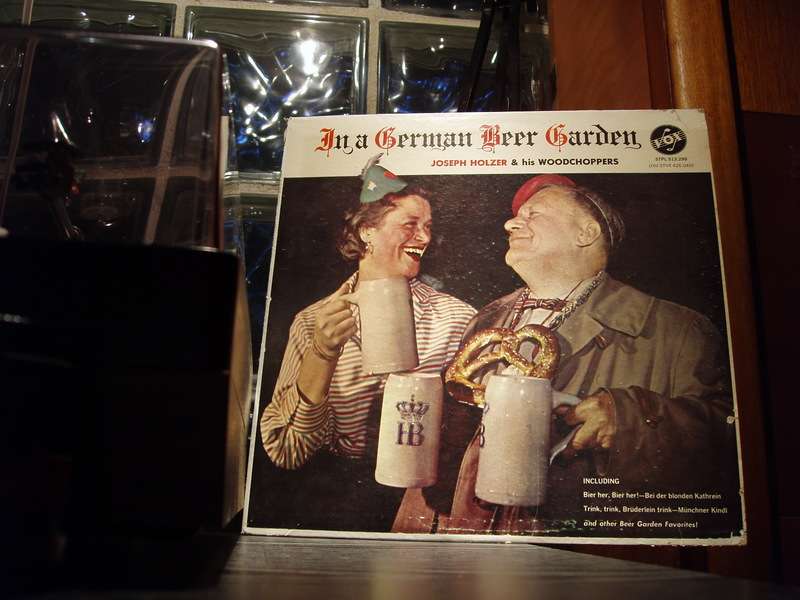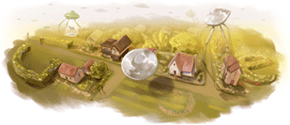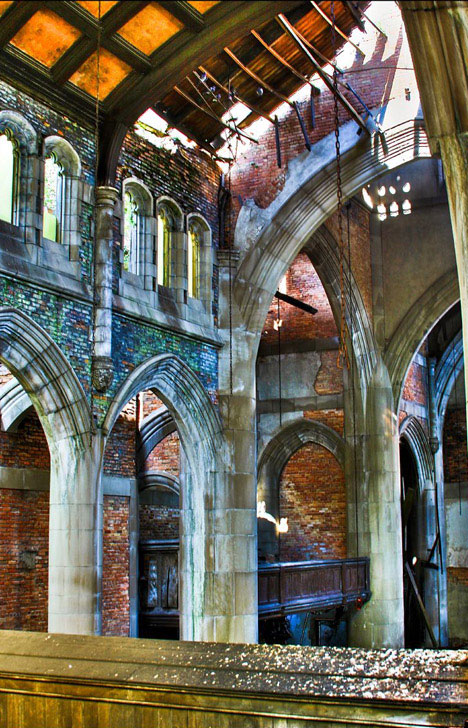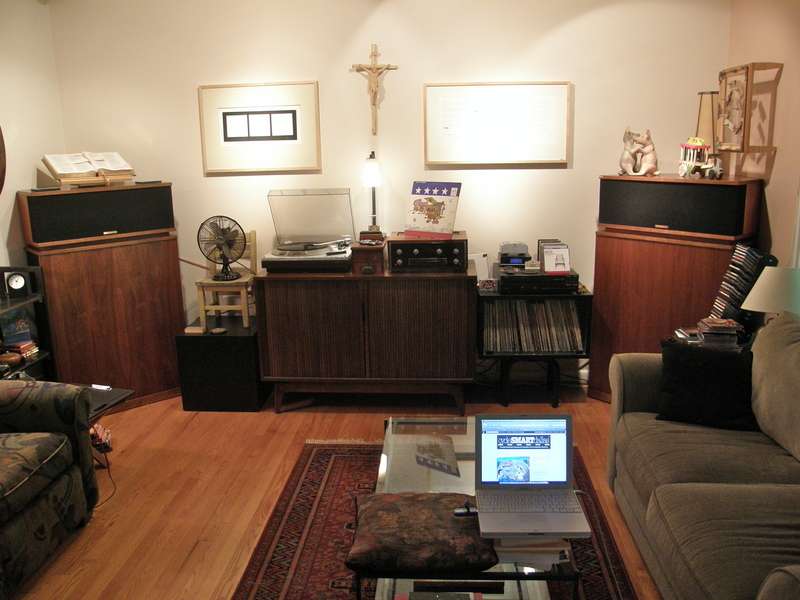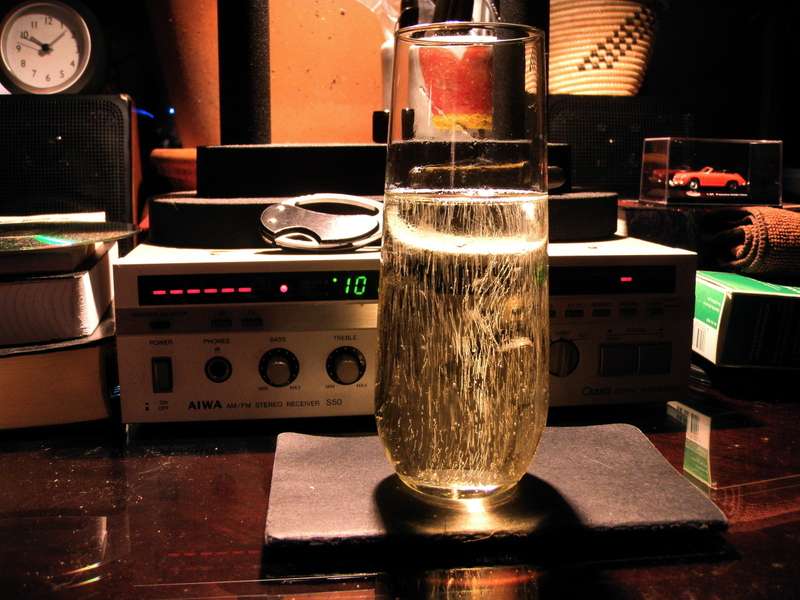
...and the Damned Fool. A curmudgeonly review of life, the universe, and everything... including, as appropriate, The Good News. A proud member of the True Reason Community.
Dec 31, 2009
Dec 30, 2009
Gimme' that old-time religion: Church-goin' in Dallas County ain't as excitin' as it used to be.
SHOOTOUT AT PLEASANT VALLEY - 051
Sensation and Lurid Scene at Pleasant
Valley Church Yesterday
June 27, 1897
An unusually large congregation assembled at the Pleasant Valley church, five miles east of Garland, yesterday forenoon to hear the Rev. Dr. Patterson, of Ellis county, preach.
The preliminary service of song and prayer was over, and the preacher was about to announce his text, and the men and boys on the outside were throwing away their quids of tobacco and cigarette stubs and getting ready to go inside, when Augustus A. Garrison appeared in front of the church, and walking up to Frank Jones, said: "Now D--n you, I've got you," and shot him dead.
Tom Jones, brother to Frank, who was close by, pulled a pistol, where upon Garrison proceeded to shoot at him, the second shot from Garrison's pistol shattering Jones' left thigh bone, felling him to the ground. But Jones, raising himself on his elbow, continued to shoot, but it was not until the sixth shot he got Garrison. The bullet entered near Garrison's heart and ranged upward, killing him instantly.
The congregation stampeded in the wildest fashion. The women screamed and fainted, children were run over and trampled upon, excited men rushed hither and thither and horses and mules broke loose and ran away, tearing up vehicles, and the utmost confusion reigned.
Garrison's brother got hold of his dead kinsmen's pistol, and Will Jones, a brother to Frank and Tom, appeared on the scene with a big 45 gun, and there would undoubtedly have been additinal bloodshed had not neighbors interposed and kept the men apart.
Tom Jones, in a dying condition, was removed to his home. The surgeons announced that the bone of the left thigh was shattered for a distance of six inches and that the patient was dangerously wounded, and his condition rendered still more critical by the great loss of blood.
The bodies of the dead were left as they fell until Justice Swim, of Garland, could come out and viewed them, then they were removed to their respective homes, and prepared for interment.
Augustus A. Garrison was 25 years old, and the son of Widow Garrison. There are three surviving brothers and several sisters. Frank Jones was 20 years old and Tom, 16. The latter were sons of Jesse Jones, who lived a mile from the church and half a mile from Widow Garrison, both families highly respectable and well-to-do. They have lived neighbors for years. The children grew up together, attending the same school and same Sunday school from the time they were carried to church as sleeping infants until yesterday.
The boys in both families were sober and industrious; they lived in a local option precinct, and whisky had nothing to do with the tragedy.
Frank Jones had seduced, or was charged with having seduced Garrison's sister, the young lady giving birth to a child last spring. Augustus Garrison told young Jones at the time that if he did not repair the wrong by marrying the girl, he would kill him.
In order to avoid a collision, Jones left the neighborhood and did not return until last Saturday. Sunday morning, he went over to the church, as he had been in the habit of doing all his life. He was probably expecting trouble, as he had a six-shooter on him, but did not get to use it, as Garrison shot him three times and killed him before he could pull it.
The funeral of Garrison took place this forenoon and that of Frank Jones will occur this afternoon, both from the same church and to the same cemetery near the church. The people in the neighborhood turning out on both occasions and extending their sympathies and condolence to both stricken families.
Constable C. P. Bane of Garland, who was in the city, said to a Times Herald reporter: (parts of interview with Bane omitted) "Frank Jones, who was shot three times by Gus Garrison, did not make an attempt to pull his pistol, and it would have done him no good if he had, as it would not work. It was a fine pistol, but it had beome so rusty that it could not be cocked. It wa a 38-caliber Winchester Colt, and had only two loads in it. Two of Jones' bullets lodged in the church door, which the congregation had fortunately closed. Most of the people in the church jumped out of the windows. Miss Garrison, who was the cause of the trouble , is a very young girl, not over fifteen years old."
Note: "Widow Garrison" was Nancy Hannah Elvirie Poovey Garrison.
Dallas Times Herald June 27, 1897
I guess folks used to raise their hands in church for a different reason in the old days.
Dec 27, 2009
Dec 24, 2009
Put this on your shopping list.
Dec 16, 2009
Dec 14, 2009
Out of the mouths of retired bishops
-- William Frey
Dec 6, 2009
Dec 3, 2009
Nov 29, 2009
Nov 22, 2009
Winnie the pooh.
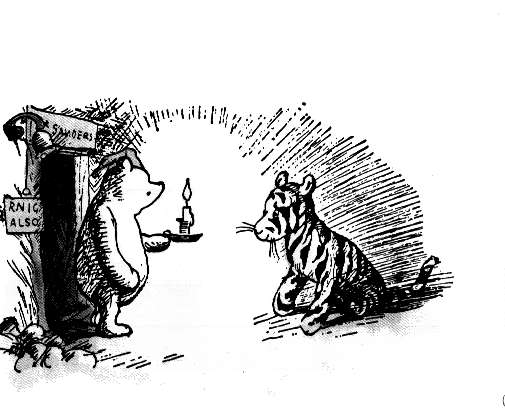
"The Old Testament is responsible for more atheism, agnosticism, disbelief — call it what you will — than any book ever written; it has emptied more churches than all the counterattractions of cinema, motor bicycle and golf course."
-- A. A. Milne
Nov 6, 2009
Oct 27, 2009
Oct 24, 2009
Oct 10, 2009
The Following Message...

"Lead, follow, or get out of the way." -- Thomas Paine
In various endeavors in my life, I've invoked this mantra as I've found myself engaged in pointless squabbles and indecisive actions from my compatriots. Lead, and I'll follow. Follow, and I'll lead. Or just get out of the way.
Wrongly, I've invoked this point in my church dealings.
God's command to us, to the Old Covenant Israelites as well as to New Testament Christians, has always been simply, "Follow." But the Israelites wanted a king, and the Christians wanted a priest... someone else to follow, letting that person be concerned with following God. We wanted someone we could see and touch (and stone, too).
We have one command, follow. We have only one option.
Oct 9, 2009
Oct 7, 2009
Bursting skins.

This morning's Gospel lesson (revised common lectionary) came from the ninth chapter of Matthew. I highlight what was highlighted for me, verses 16 and 17.
"No one sews a patch of unshrunk cloth on an old garment, for the patch will pull away from the garment, making the tear worse. Neither do men pour new wine into old wineskins. If they do, the skins will burst, the wine will run out and the wineskins will be ruined. No, they pour new wine into new wineskins, and both are preserved."Then I found this in my inbox.
Sep 21, 2009
Sep 16, 2009
Sep 13, 2009
Sep 6, 2009
Great moments in grandparenting.

For my grandson's first Christmas, I gave him a G.I. Joe doll that I had repackaged as "My First War Toy from Bechtel!". It got a mixed reception.
Now, almost five years later, and after countless hours of his playing with Star Wars figurines and spaceships, I've given him his first toy gun. It's a replica bolt-action Enfield .308.
He immediately struck this pose.
What say you? Nature or nurture?
Aug 27, 2009
How to Cool Burns from Chili Peppers

Chili peppers, such as jalapeno, cayenne, and habanero peppers, contain capsaicin, which is the main ingredient in pepper spray. Capsaicin can add flavor and spiciness to food, but can also cause an extreme burning sensation which can last for minutes or even hours. If your mouth is burning up, here's how to cool off. These tips will likely work on your skin, too!
Steps
1. Drink milk. There's a protein found in milk called casein that acts like a detergent against capsaicin. It'll actually pull the capsaicin compounds away from the nerve receptor binding sites in your mouth. Drink at least a half cup, making sure you rinse your mouth well first.[1] You can spit it out, but you won't get as much relief in your throat that way.
* The colder the milk is, the more effective it is against the burning sensation.
* If you don't have any milk, you may be able to soothe your mouth with the casein in cottage cheese, cold plain yoghurt or ice cream.
2. Drink sugar water. Mix a tablespoon or more of sugar with a cup water and use it to rinse out your mouth. Cold sugar solution (10%) at 20°C/68°F is about as effective as whole milk at 5°C/41°F[2] but the relief only lasts while the mixture is still in your mouth so you'll need to keep rinsing and spitting until the pain subsides.
3. Drink alcohol. Capsaicin is soluble in alcohol, so drinking a beer or a shot can help wash it away. It's not nearly as effective, however, as milk.[4]
4. Rinse your mouth with oil. Capsaicin is also soluble in vegetable oils[4] so swishing some around in your mouth might help. Keep in mind that oil has been found to be only slightly more effective than water in relieving pepper burns, so use it only if nothing else is available.[1]
5. Eat some chocolate. The capsaicin in peppers is more soluble in fat than aqueous based solutions (ie beer, water, even low-fat milk). The high fat content of most chocolate bars will help to remove some of the capsaicin from your mouth. Milk chocolate generally has a higher fat content than dark chocolate and therefore should give better relief.
Unverified Folk Remedies
1. Try any of the following folk remedies, but keep in mind that these methods have not been verified in a reliable third party source.
* Cheese, for the same reason as milk.
* Eat some cucumber. This is in fact a common way to deal with too much heat in the food in Indonesia and Thailand.
* Curries and other hot dishes are almost always accompanied by copious amounts of rice in India, because all starchy foods combat the burning sensation. Potato will work as well, as will bread. Chew well, so that the tongue is "washed" by the rice, potato or bread.
* Use salt. Salting the food or eating salty chips can soothe the burn.
* Try honey. Sopapillas with honey are served with spicy foods in some restaurants.
* Pepto Bismol may stop the burn.
* Try taking a tablet of Benadryl.
* Try eating a raw carrot. There's no trick to swishing it around. Just take a bite and the burn will significantly diminish.
* White toothpaste can significantly reduce the burning from habañero oils on the skin. It will likely work in the mouth and/or with other peppers.
* Coconut milk works very well to cut the burn and modulate the heat level of a spicy recipe.
* Bite into a slice of lemon, orange or other citrus fruit or drink a citrus juice. The acid in the fruit will relieve the burn.
Tips
* The burning sensation will fade away on its own over time (6-8 hours).
Warnings
* Avoid getting peppers in your nose, eyes, or any other openings, which is a very painful experience. Pepper spray is made from chili peppers, so if you have happened to have been sprayed in the past, you know what this feels like.
* Avoid getting on open cuts.
* Wash your hands before (and after, of course) using the bathroom (no explanation needed).
* Be careful handling eye contacts after handling spicy peppers. Capsaicin is difficult to fully remove and does not completely wash away with soap and water. If you wear contacts, it is best to use gloves while handling peppers.
From www.wikihow.com
Aug 24, 2009
Sticky Fingers
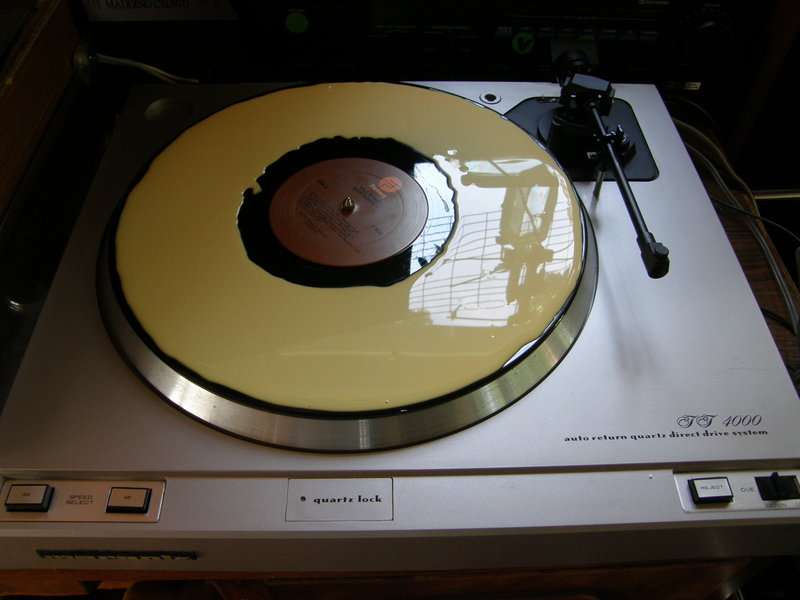
I buy a lot of used LPs, mostly from Half Price Books and The Salvation Army, but also from any "thrift store" I happen to be near. I pay anywhere from 50¢ to $5 for the discs (usually less than $5, and sometimes more for a rarity).
Needless to say, these things are often very dirty, even to the point of being unplayable due to mold, dirt, grease, and paper residue (I don't buy severely scratched LPs). A really good record cleaning machine costs between $500 and $1000. That's out of my price range.
So, I use cheaper (but effective) methods. These range from the quick (and dirty) to more time consuming methods.
For starters, I'll clean a new-to-me disc with my old Discwasher brush, using a homemade cleaning concoction involving lots of distilled water, some 91% IPA, and a drop of Dr. Bonner's unscented soap. This is an effective cleaning method for the least filthy discs.
Dirtier discs get the steam treatment, wherein I spray concentrated distilled-water steam onto a record, and wipe it dry with a micofibre cloth. This a scary method, as newer LPs ('70s and up) will buck and warp under the steam heat, but quickly return to normal. Scary indeed.
For the most serious cleanings, I use wood glue (I may steam it first). I spread the glue in a thin layer over the surface of the disc (Titebond II seems to work best), using an old credit card as the spreader. I then let the glue dry completely (no translucent areas), which takes 4 to 8 hours. I then use my thumbnail to lift a small area near the edge, and carefully peel the entire mask away.
It seems to work quite well. This methodology emanates from European record collectors (who can't be wrong... they're Euro!). Click on the title of this post for more info.
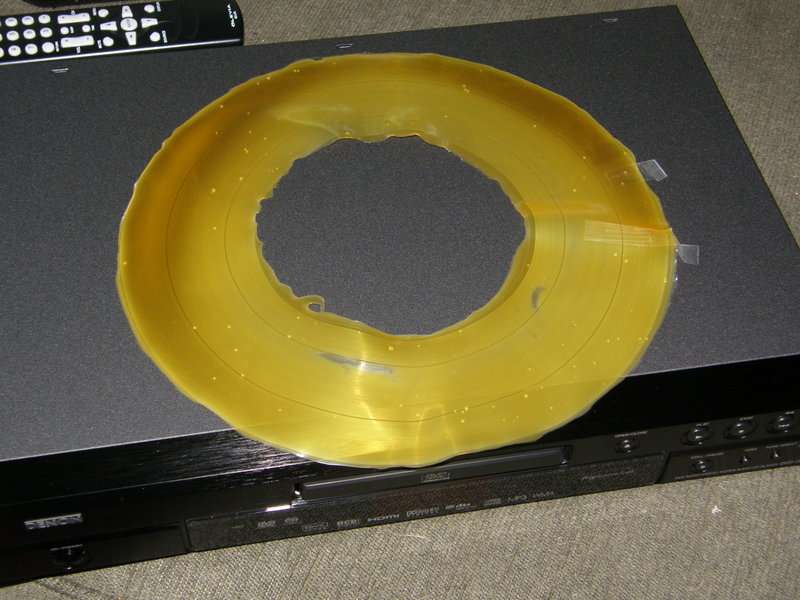
The peeled mask of Titebond II wood glue. If you try and play it on your turntable, all you hear is, "Paul is dead. Paul is dead."
Aug 19, 2009
On this day...

Aug 19, 1692
Five women and a clergyman were executed after being convicted of witchcraft in Salem, MA.
In other news...
1848
The discovery of gold in California was reported by the New York Herald.
1921
Gene Roddenberry was born in El Paso, Texas. Roddenberry's first career was as an airline pilot. Later, he created the TV series Star Trek.
1946
U.S. President William Jefferson Clinton was born in Hope, Arkansas (the same year that Klipsch & Associates began making the Klipschorn).
1955
Severe flooding in the aftermath of Hurricane Diane, in the Northeast United States, claimed 200 lives.
1960
Two dogs were launched in a satellite into Earth's orbit by the Soviet Union.
Re: New.
Reformation, revival and renewal
We need ... a holistic or integrated vision of renewal in
every dimension of the church's life.
The Roman Catholic word for this, at least since Vatican
II (1963-65), has been "aggiornamento", the process of
bringing the church up to date in order to meet the
challenges of the modern world. It implies that the world
is changing rapidly and that, if the church is to survive,
it must keep pace with this change, although without either
compromising its own standards or conforming to the
world's.
Protestants use a different vocabulary to describe the
continuously needed restoring and refreshing of the church.
Our two favorite words are 'reform', indicating the kind of
reformation of faith and life according to Scripture which
took place in the sixteenth century, and 'revival',
denoting an altogether supernatural visitation of a church
or community by God, bringing conviction, repentance,
confession, the conversion of sinners and the recovery of
backsliders. 'Reformation' usually stresses the power of
the Word of God, and 'revival' the power of the Spirit of
God, in his work of restoring the church. Perhaps we
should keep the word 'renewal' to describe a movement which
combines revival by God's Spirit with reformation by his
Word. Since the Word is the Spirit's sword, there is bound
to be something lopsided about contemplating either without
the other.
--John Stott, from "The Contemporary Christian" (Leicester and Downers Grove: IVP, 1992), p. 258.
Aug 13, 2009
Suffer Fools Gladly
Definition from Wiktionary, a free dictionary
[edit] English
[edit] Verb
to suffer fools gladly
1. (idiomatic) To be tolerant of stupidity or incompetence in other people.
* 1611, King James Bible, 2 Corinthians 11: 19.
For ye suffer fools gladly, seeing ye yourselves are wise.
* 1912, George Bernard Shaw, Pygmalion
He was, I believe, not in the least an ill-natured man: very much the opposite, I should say; but he would not suffer fools gladly.
[edit] Usage notes
* Nowadays more usually used in the negative, as a description of what someone does not do.
Aug 9, 2009
An argument for the existence of God.
-- John Cage
Aug 8, 2009
Aug 2, 2009
The Ruins of Detroit
Carthage, USA.
The glory that was Carthage.
Sic transit gloria.
Aug 1, 2009
Jul 31, 2009
Jul 26, 2009
Jul 25, 2009
Jul 20, 2009
Jul 10, 2009
ECUSA Presiding Bishop to Martin Luther: "You were wrong." To Billy Graham: "You're a dangerous heretic!"
Episcopal presiding bishop terms individualistic salvation 'heresy'
By Bob Allen Thursday, July 09, 2009 ANAHEIM, Calif. (ABP) -- The presiding bishop of the Episcopal Church called the evangelical notion that individuals can be right with God a "great Western heresy" that is behind many problems facing the church and the wider society.
Describing a United States church in crisis, Presiding Bishop Katharine Jefferts Schori told delegates to the group's triennial meeting July 8 in Anaheim, Calif., that the overarching connection to problems facing Episcopalians has to do with "the great Western heresy -- that we can be saved as individuals, that any of us alone can be in right relationship with God."
"It's caricatured in some quarters by insisting that salvation depends on reciting a specific verbal formula about Jesus," Jefferts Schori, the first woman to be elected as a primate in the worldwide Anglican Communion three years ago, said. "That individualist focus is a form of idolatry, for it puts me and my words in the place that only God can occupy, at the center of existence, as the ground of being."
Jefferts Schori said countering individualistic faith was one reason the theme chosen for the meeting was "Ubuntu," an African word that describes humaneness, caring, sharing and being in harmony with all of creation.
"Ubuntu doesn't have any 'I's in it," she said. "The 'I' only emerges as we connect -- and that is really what the word means: I am because we are, and I can only become a whole person in relationship with others. There is no 'I' without 'you,' and in our context, you and I are known only as we reflect the image of the One who created us."
Jefferts Schori said "heretical and individualistic understanding" contributes to problems like neglect for the environment and the current worldwide economic recession.
"The sins of a few have wreaked havoc with the lives of many, as greed and dishonesty have destroyed livelihoods, educational possibilities, care for the aged, and multiple forms of creativity," she said. "And that's just the aftermath of Ponzi schemes for which a handful will go to jail."
She said in order to be faithful, "we need to be continually rediscovering that my needs are not the only significant ones."
"Ubuntu implies that selfishness and self-centeredness cannot long survive," she said. "We are our siblings' knowers and their keepers, and we cannot be known without them."
"We have no meaning, no true existence in isolation," she said. "We shall indeed die as we forget or ignore that reality."
About 200 Episcopal bishops and 850 clergy and lay deputies were expected to convene for the 10-day meeting. Business items are set to include debates over human sexuality, politics and poverty.
One resolution being considered calls for "generous discretion" to be extended to clergy in exercising pastoral ministry in six states -- Connecticut, Iowa, Maine, Massachusetts, New Hampshire and Vermont -- where the civil marriage of same-gender couples has been legalized as well as other states that may follow suit in the next three years.
The 2.1-million-member denomination has argued vociferously about homosexuality since 2003, when the group approved the election of its first openly gay bishop, Gene Robinson of New Hampshire. Many more conservative Episcopalians and a handful of congregations have begun breaking away from the church in the years since.
Southern Baptist mega-church pastor Rick Warren, author of The Purpose Driven Life, took sides in his sister denomination's debate recently by showing up in Texas to encourage about 800 Episcopalians attending the first annual meeting of a conservative breakaway group calling itself the Anglican Church in North America.
Warren, who spoke out last fall against legal gay marriage in California, said in January that any nearby Anglican congregation that loses its property after breaking with the U.S. Episcopal Church was welcome to meet on the campus of his Saddleback Church.
-30-
Bob AllenThis e-mail address is being protected from spam bots, you need JavaScript enabled to view it is senior writer for Associated Baptist Press.
Katharine Jefferts Schori not only refutes the whole of the Protestant Reformation and the martyrdom at the stake of Archbishop Thomas Cranmer and Bishops Hugh Latimer and Nicholas Ridley. Worse, she she refutes the words of Jesus himself.
Jesus' first words in his ministry were "Repent, for the kingdom of heaven is near" (Matthew 4:17). John 3:16 drives home the point about believing (an active term, not a passive one). The very "sinner's prayer" that Jefferts Schori calls heretical is a combination of Jesus' own words and instructions, drawn from Romans 10:9-10, Luke 18:13-14, and Matthew 7:7.
Perhaps if she were to go into her private chapel, kneel before God, and pray this, she might yet be saved. Other bishops of the church have done just that... after their consecrations.
Heavenly Father, I know that I have sinned against you and that my sins separate me from you. I am truly sorry. I now want to turn away from my past sinful life and turn to you for forgiveness. Please forgive me, and help me avoid sinning again. I believe that your son, Jesus Christ, died for my sins, was resurrected from the dead, is alive, and hears my prayer. I invite Jesus to become the Lord of my life, to rule and reign in my heart from this day forward. Please send your Holy Spirit to help me obey You, and to do Your will for the rest of my life. In Jesus' name I pray, Amen
Jun 28, 2009
W.W.J.P.? (What would Jesus pack?)

"Welcome to New Bethel Assembly of God. Keep those hands in the air. Hallelujah!"
A pastor in the US state of Kentucky told his flock to bring handguns to church in what he said was an effort to promote safe gun ownership.
Pastor Ken Pagano told parishioners to bring their unloaded guns to New Bethel Church in Louisville for a service celebrating the right to bear arms.
He said he acted after church members voiced fears the Obama administration could tighten gun control laws.
When the service began, some 200 people were present, AP news agency said.
"We are wanting to send a message that there are legal, civil, intelligent and law-abiding citizens who also own guns," Mr Pagano told the congregation.
"If it were not for a deep-seated belief in the right to bear arms, this country would not be here today," he said.
Story from BBC NEWS:The pastor also held a handgun raffle, as well as providing information on gun safety.
"I wish more churches did this, I wish more people did this," the Louisville Courier-Journal quoted one attendee, Doreen Rogers, as saying.
"For some reason, most people think that carrying guns is sinful. It's not. I think my life is worth protecting."
About 10 members of a private local militia also attended, the Courier-Journal said.
A coalition of religious groups and campaigners held a rival gun-free event at the same time on the other side of Louisville.
"The idea of wearing guns to churches or any sacred space I think many people find deeply troubling," organiser Terry Taylor told AP.
In the US, the right to bear arms is enshrined in the Second Amendment of the US Constitution. There are thought to be more than 200 million firearms in private hands.
But some gun owners fear that the new administration in the White House could try to challenge or amend some gun ownership laws.
Critics of the laws, meanwhile, link high levels of gun crime with high levels of gun ownership.
http://news.bbc.co.uk/go/pr/fr/-/2/hi/americas/8122767.stm
Published: 2009/06/28 02:39:02 GMT
© BBC MMIX
Speaking as a gun owner and as a follower of Jesus Christ, this is just so wrong.
Jun 25, 2009
Jun 22, 2009
Baptismal Fun

We had a rare adult baptism at my church yesterday. Being of anabaptist tendencies in a catholic/Lutheran setting, I often cringe at parts of the ceremony. The traditional "moistening of the forehead" leaves me unconvinced in the efficacy of the ritual.
Better would be a dunking booth (gussied up for proper decorum).
The baptismal candidate, dressed in white robes, could take their place in the booth, and there profess their belief before man and God. The attending pastor could then throw (overhand) three softballs at the target, while invoking the three-in-one names of the Trinity.
"In the name of The Father!" (whoosh!)
"...and of the Son!" (whoosh!)
"...and of the Holy Spirit!" (SPLASH!)
Jun 18, 2009
Jun 16, 2009
Jun 12, 2009
This beer is the pits...

BBQ pits, that is.
Shiner has a new beer. It's a Helles Rauchbier, (if that's possible, and I guess it is). Shiner Smokehaus.
The malt has been mesquite BBQ'd!
Really does taste and smell like I'm drinking a nice malt lager while smokin' up a slab'o ribs.
"The Perfect Sommer Bier" it says on the neck. This Sommer likes it. ;-)
Jun 9, 2009
Les Paul is 94 today.
...and he still plays at the Iridium Club on Times Square every Monday night (two sets).
Jun 8, 2009
Help me get this out of my head!

HOMAGE TO MARAT - a song from a play: The Persecution and Assassination of Jean-Paul Marat as Performed by the Inmates of the Asylum at Charendon Under the Direction of the Marquis de Sade
Four years after the revolution and the old king's execution
Four years after, remember how, those courtiers took their final vow
"String up every aristocrat!
Out with the priests, let them live on their fat!"
Four years after we started fighting,
Marat keeps on with his writing.
Four years after the Bastille fell,
He still recalls the old battle yell
"Down with all of the ruling class!
Throw all the generals out on their arse!"
Good old Marat by your side we'll stand or fall
You're the only one that we can trust at all
Four years he fought and he fought unafraid,
Sniffing down traitors by traitors betrayed,
Marat in the courtroom, Marat underground,
Sometimes the otter and sometimes the hound,
Fighting all the gentry and fighting every priest,
Businessman the bourgeois the military beast,
Marat always ready to stifle every scheme,
of the sons of the arse licking dying regime
We've got new generals, our leaders are new,
They sit and they argue and all that they do
Is sell their own colleagues and ride upon their backs
And jail them and break them and give them all the axe
Screaming in language that no one understands
Of the rights that we grabbed with our own bleeding hands
When we wiped out the bosses and stormed through the wall
Of the prison they told us would outlast us all!
Marat we're poor,
And the poor stay poor.
Marat don't make
Us wait anymore.
We want our rights and we don't care how,
We want our revolution now.
Why do they have the gold?
Why do they have the power?
Why why why?
Do they have the friends at the top?
Why do they have the jobs at the top?
We've got nothing,
Always had nothing,
Nothing but holes and millions of them.
Living in holes dying in holes,
Holes in our bellies and holes in our clothes!
Marat we're poor,
And the poor stay poor.
Marat don't make us wait anymore.
We want our rights, and we don't care how,
We want our revolution... now.
Jun 6, 2009
Jun 3, 2009
For truth.
-- Charles Haddon Spurgeon
May 25, 2009
Khrist and the Kasuals.

In a wide-ranging discussion about the state of faith in America, veteran researcher George Barna recently addressed questions raised by his new book, The Seven Faith Tribes: Who They Are, What They Believe, and Why They Matter. In that book, Barna outlines seven diverse faith segments, profiling their lifestyles, religious beliefs and practices, values and life goals. The seven tribes include Casual Christians, Captive Christians, Mormons, Jews, Pantheists, Muslims and Skeptics.
More.
May 24, 2009
Keep Out

The cause of [the cessation of the extraordinary gifts of the Holy Ghost] was not, ... "because there was no more occasion for them," because all the world was become Christians... The real cause was, "the love of many," almost of all Christians, so called, was "waxed cold." The Christians had no more of the Spirit of Christ, than the other heathens.
The Son of man, when he came to examine his church, could hardly "find faith upon earth." This was the real cause, why the extraordinary gifts of the Holy Ghost were no longer to be found in the Christian church; because the Christians were turned heathens again, and had only a dead form left.
--John Wesley (1703-1791), Sermons on Several Occasions,
New York: Carlton & Phillips, 1855, Sermon XCIV. "The
More Excellent Way", vol. 2, p. 266.
See the book.
May 21, 2009
St. Philip's ascends.

Today is Ascension Day, the commemoration of the day Jesus returned to Heaven. His parting words to his disciples (including St. Philip the Evangelist) from Matthew 28:16-20:
- (16) Then the eleven disciples went away into Galilee, into a mountain where Jesus had appointed them. (17) And when they saw him, they worshiped him: but some doubted. (18) And Jesus came and spoke unto them, saying, "All power is given unto me in heaven and in earth. (19) Go ye therefore, and teach all nations, baptizing them in the name of the Father, and of the Son, and of the Holy Ghost: (20) Teaching them to observe all things whatsoever I have commanded you: and, lo, I am with you always, even unto the end of the world."
So today is also "The Great Commission Day." Rather than mourn Jesus' leaving us, we celebrate his sending us out into the world to do his work, strengthened and accompanied by the Holy Spirit. And today is also a day that St. Philip the Joy Giver Episcopal Church ponders their future, now that they have been closed as a mission of the Episcopal Diocese of Texas.
But who was Philip the Joy Giver?
Philip, Deacon and Evangelist
Acts 8:26-40 --
Then an angel of the Lord said to Philip, "Get up and go toward the south to the road that goes down from Jerusalem to Gaza." (This is a wilderness road.) So he got up and went.
Now there was an Ethiopian eunuch, a court official of the Candace, queen of the Ethiopians, in charge of her entire treasury. He had come to Jerusalem to worship and was returning home; seated in his chariot, he was reading the prophet Isaiah.
Then the Spirit said to Philip, "Go over to this chariot and join it." So Philip ran up to it and heard him reading the prophet Isaiah. He asked, "Do you understand what you are reading?" He replied, "How can I, unless someone guides me?" And he invited Philip to get in and sit beside him. Now the passage of the scripture that he was reading was this:
"Like a sheep he was led to the slaughter,
and like a lamb silent before its shearer,
so he does not open his mouth.
In his humiliation justice was denied him.
Who can describe his generation?
For his life is taken way from the earth."
The eunuch asked Philip, "About whom, may I ask you, does the prophet say this, about himself or about someone else?" Then Philip began to speak, and starting with this scripture, he proclaimed to him the good news about Jesus.
As they were going along the road, they came to some water; and the eunuch said, "Look, here is water! What is to prevent me from being baptized?" He commanded the chariot to stop, and both of them, Philip an the eunuch, went down into the water, and Philip baptized him.
When they came up out of the water, the Spirit of the Lord snatched Philip away; the eunuch saw him no more, and went on his way rejoicing. But Philip found himself at Azotus, and as he was passing through the region he proclaimed the good news to all the towns until he came to Caesarea.
Immediately after witnessing to and baptizing the Ethiopian (although the baptism was conducted by the Holy Spirit, Philip simply poured the water), Philip was transported away by the Holy Spirit, and and went on his way loudly singing praises to God.
That is what I'd suggest the band of believers who make up the community known as St. Philip the Joy Giver do. Allow the Holy Spirit to transport them to a new place, where they can sing joyful songs of praise to our God, our resurrected Lord, and the Holy Spirit, Three In One, in thanksgiving for what he has done in their lives.
Go in peace to love and serve the Lord. Thanks be to God!
Holy God, no one is excluded from your love, and your truth transforms the minds of all who seek you: As your servant Philip was led to embrace the fullness of your salvation and to bring the stranger to Baptism, so give us all the grace to be heralds of the Gospel, proclaiming your love in Jesus Christ our Savior, who lives and reigns with you and the Holy Spirit, one God, now and for ever. Amen.
May 19, 2009
Leftovers Night at Casa del Verano
May 18, 2009
That's all, Volks! Tipp o' the hat memories.

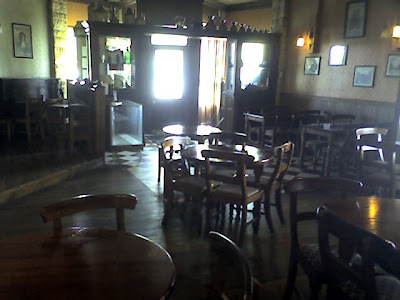

Quaintly crappy cell-phone pics by P.M. Summer.
The Tipperary Inn closed again last weekend. It closed once before, was bought and reopened, and failed again.
The Tipperary Inn (not to be confused with Fort Tipperary just east of White Rock Lake) was an Irish-style bar/pub, complete with actual pub furnishings imported from Ole Eire. Legend says the Tipperary's first owners (who were Irish) paid $1 million in cash for the furnishings. They were in the "sporting hardware export" business, so it was whispered, and could be found hanging around Knights of Columbus halls in the USA.
The triangularly-shaped stone building they were housed in was originally the Lakewood Volk's Department Store, an upper-middle class shopping venue that I grew up with. This particular location (designed by George Dahl?) had multiple levels, and a fascinating indoor/outdoor goldfish pond that went through a glass wall to the outside. There was even an item I can't believe REALLY existed as I (and others) remember it... an X-Ray machine to size a child's foot properly. The bi-level corner of the building the Tipp was located in was the Women's Fitted Wear section (as opposed to Ready-to-Wear), and the mezzanine was Couture.
So, I paid my respects to the Tipp last Thursday after work. I walked in at 4pm (opening). It was un-air conditioned at that time (cost savings?), and had the distantly all-too-familiar smell of stale beer and bleach that I remember from my bar-keep days during my college years. I sat at the bar and ordered my preferred lager, a Spaten Bock, thinking perhaps I was making a mistake (ordering a Bavarian lager during the parting visit to an Irish pub). As I was pondering my error, I heard the gush of CO2 coming from the tap, the tell-tale sound of a blown keg. "Make that a Guinness" I said to the Mohawk sporting barkeep in a First Cav t-shirt (IIRC).
I drank my beer, wishing I'd had the foresight to order a Guinness 250 instead. Then it happened. A bad idea. A potentially ruinous idea. What if I pulled together some investors, cashed out my retirement, took over the Tipp, contracted with Franconia Brewery to brew private-label beers, did some minor redecorating, and re-opened as the "Volks Brauhaus"?
Or even as "The White Horse Tavern," appealing to the historically literate renegades at nearby Dallas Theological Seminary.
May 15, 2009
May 12, 2009
OK Cupid
| You are a Social Moderate (50% permissive) and an... Economic Liberal (25% permissive) You are best described as a:
Link: The Politics Test on Ok Cupid Also: The OkCupid Dating Persona Test |
Today's unrepentant thievery

If New Testament Christianity is to reappear today with its power and joy and courage, men must recapture the basic conviction that this is a Visited Planet. It is not enough to express formal belief in the "Incarnation" or in the "Divinity of Christ"; the staggering truth must be accepted afresh--that in this vast, mysterious Universe, of which we are an almost infinitesimal part, the great Mystery, Whom we call God, has visited our planet in Person. It is from this conviction that there springs unconquerable certainty and unquenchable faith and hope. It is not enough to believe theoretically that Jesus was both God and Man; not enough to admire, respect, and even worship Him; it is not even enough to try to follow Him.
The reason for the insufficiency of these things is that the modern intelligent mind, which has had its horizons widened in dozens of different ways, has got to be shocked afresh by the audacious central Fact--that, as a sober matter of history, God became one of us.
... J. B. Phillips (1906-1982), New Testament Christianity
[1956], chapt. iii, par. 3
See the book at http://cqod.com/r/rs056
May 10, 2009
May 8, 2009
Apr 29, 2009
Plan 9 From Outer Space

When the City of Dallas developed its current Council adopted Bicycle Transportation Plan (working with the Department of Transportation and over 100 bicyclists from local cycling organizations), a “clean-slate” design approach was taken. All possible facility types were considered.
There are basically four bicycle facility designs: street separated Multi-Use Paths, on-street bike lanes, side paths/cycle-tracks (all examples of segregated facilities), and on-street bike routes (shared lane facility). Each has its preferred application scenario.
Multi-Use Paths/side paths/cycle-tracks
Currently, the City is in the process of completing 100 miles of paved, 12’ wide, off-street trails though parks, under power lines, and parallel to rail corridors. Because these facilities are constrained by location and available right-of-way, their use as a viable, city-wide transportation element is limited. But they can be a good enhancement to an on-street system.
Side paths (also called cycle tracks) have been discouraged by traffic engineers and responsible bicycle planners for some time, due to the dramatic increase in collisions between turning automobiles and straight through cyclists. The Netherlands (where such facilities are extremely popular) have documented up to an 180% increase in serious collisions on side paths compared to on-street cycling.
Bike Lanes
Bike Lanes are preferred by cyclists who fear sharing a roadway with automobile traffic and motorists who have a dislike of sharing the roadway with bicyclists.
From a traffic engineering perspective, a bike lane is classified as a “traffic control device”, whose job is to channel existing bicycles out of the way of motor vehicles. The popular notion is the opposite, that bike lanes are designed to attract cyclists, but that is not how they function or why they were designed. To install bike lanes that function, you need two pre-existent conditions: high volume of cyclists in a concentrated area (i.e., a large college campus and surrounding area), and sufficient road width to accommodate a 5’ lane.
Most urban thoroughfares and collectors in Dallas have 11’ wide vehicle travel lanes (a foot narrower than the current recommended minimum and three feet narrower than the Texas Department of Transportation preference). The recommended width for bike lanes is four feet, with a one foot edge stripe (five feet in total width from curb).
On a typical Dallas three-lane divided urban thoroughfare, the cross-section looks like this: 11’-11’-11’----11’-11’-11’. Attempting to install bike lanes on such a street without removing travel lanes would result in vehicle travel lanes that are only 9 feet wide (5’-9’-9’-9’----9’-9’-9’-5’), 25% narrower than current minimum recommendations, and too narrow to accommodate existing truck, bus and even SUV usage. This creates traffic conflicts that can lead not only to property damage, but can even endanger lives (especially the lives of cyclists as cars are “pushed” into the available space).
To install bike lanes of the recommended 5’ width (4’ for the bike lane, with a 1’ offset from the curb), the street cross-section now looks like this, 5’-14’-14’----14’-14’-5’, dropping a full lane of traffic in each direction. When you consider that people tend to ask for bike lanes on streets that are already overcrowded, you can see how the problems are exacerbated by the attempts at alleviation. Removing one lane of traffic from a 3-lane directional configuration does not decrease that street’s capacity by 33%, but by almost 50%, resulting in increased queuing at intersections and left turns, which means increased idling and greatly increased emissions of volatile organic compounds (VOCs).
There is also a problem with banning all on-street parking on streets with bike lanes and the resulting backlash from homeowners and businesses. While many cities stripe 3’ wide bike lanes next to on-street parking (like Austin, Texas), they have proven to be very dangerous, as cyclists are often hit by opening car doors.
Contrary to popular belief, there is an increased danger to cyclists in riding in bike lanes, caused by newly created conflicts with right-turning motor vehicles. This is an unavoidable complication of having a straight-through travel lane for bicyclists located to the right of right-turn allowed motor vehicles, a lane that lulls cyclists into thinking they are protected from right-turning vehicles. The vast majority of serious car-bike collisions occur in this type of conflict, as cyclists outside of motorists’ direct line of sight, slip into the motorists’ left-side blind zone.
The conflict that many cyclists believe a bike lane protects them from (being struck from the rear by an overtaking motor vehicle) is by far the rarest of serious car-bike collisions, but it is among the most dangerous (exceeded by wrong-way cyclists hitting oncoming vehicle). Interestingly, when you remove the rural road incidence of this type of collision (the most common area for fatality occurrence), the collision rate for cyclists in a bike lane, and without a bike lane, is statistically the same.
On-Street Bike Routes
Rather than install a few miles of bike lanes, what Dallas did was create a city-wide 400 mile (800 lane miles) signed bicycle route system on local, mostly low volume, streets that parallel thoroughfares. Where a thoroughfare (or bridge) is required, the City committed to build wide-outside-lanes to create extra room for cyclists and motor vehicles to share the road. On new road construction (and reconstruction when right of way is available), depending upon posted speeds, the roadway cross section will look like this: 14’-11’-11’----11’-11’-14’, or 15’-12’-12’----12’-12’-15’.
Instead of striping less than 20 lane-miles of bike lanes (.05% of the City's streets), the City (upon the recommendation of active cyclists) signed 800 lane-miles of bike routes (10% of the City's streets), resulting in a more comprehensive city-wide bike plan than a simple bike lane system. The vast majority of these cyclist-selected routes were on low-volume local streets that paralleled major thoroughfares, and were the ideal setting for cyclists.
The plan improved real conditions for cyclists without degrading conditions for the dominant motor traffic. This approach works best in a city like Dallas with a complex street grid system dating to the late 19th and early 20th centuries. Suburban cities (and the far edges of Dallas) have a more difficult task. It was understood that an education component was required, for both cyclists and motorists, but the City Council decided to not fund that element as a cost saving measure, as the City continued to downsize staff and eliminate “non-essential” services. Reduced forces also played a part in the City's decision to decline a $1,000,000 bicycle education program for adults and children.
Dallas is preparing to undertake a comprehensive update of its current Bike Plan, and the viability and application of bike lanes and cycle tracks will again be considered, with changes in the City’s approach being preordained.

Apr 27, 2009
Observant servant.
In the beginning the church was a fellowship of men and women centering on the living Christ.
Then the church moved to Greece, where it became a philosophy.
Then it moved to Rome, where it became an institution.
Next, it moved to Europe, where it became a culture.
And, finally, it moved to America, where it became an enterprise.
-- Richard Halverson, former Chaplain of the United States Senate
Apr 21, 2009
"Will you come to the bower I have shaded for you?"

The Battle of San Jacinto, fought on April 21, 1836, was the decisive battle of the Texas Revolution. Led by General Sam Houston, the Texas Army engaged and defeated General Antonio López de Santa Anna's Mexican forces in a fight that lasted just eighteen minutes.
As the Texian infantry advanced, a single fife and a single drum played the popular love song "Will You Come to the Bower?"
Will you come to the bower I have shaded for you?
Your bed shall be of roses, be spangled with dew.
Will you, will you, will you come to the bower?
Will you, will you, will you come to the bower?
There under the bower on soft roses you'll lie,
With a blush on your cheek, but a smile in your eye.
Will you, will you, will you smile my beloved?
Will you, will you, will you smile my beloved?
But the roses we press shall not rival your lips,
nor the dew be so sweet as the kisses we'll sip.
Will you, will you, will you kiss me my beloved?
Will you, will you, will you kiss me my beloved?
Hundreds of Mexican soldiers were killed, and hundreds more captured, while only nine Texians died.
Apr 20, 2009
Burning down the house.
Apr 19, 2009
Welcome to my church...

...and (probably) to yours.
The conception of the Church which we tend to reproduce as the fruit of our missionary work is so much a replica of our own, so much that of a fundamentally settled body existing for the sake of its own members rather than that of a body of strangers and pilgrims, the sign and instrument of a supernatural and universal salvation to be revealed, that our missionary advance tends to follow the lines of cultural and political expansion, and to falter when that advance stops.
... Lesslie Newbigin (1909-1998), The Household of God, New York: Friendship Press, 1954, p. 166
See the book at http://cqod.com/r/rs036
Apr 16, 2009
Dallas guitarist Rocky Hill dies at 62

Dallas/Houston guitarist Rocky Hill dies at 62
By ANDREW DANSBY
Copyright 2009 Houston Chronicle
April 13, 2009, 4:24PM
Rocky Hill was described as “a monster on guitar,” though over four decades he could be a difficult creature to find. His career dated back to the 1960s when he was a hotshot player with blue hair joined on bass by his brother Dusty in a psychedelic rock band. That a Google search on “Rocky Hill” turns out dozens of entries on a town in Connecticut and nearly nothing on the guitarist is testament to how good a musician can be without ever finding his rewards.
Hill died Friday at his Houston-area home; he was 62. A statement claimed he died of “undisclosed complications of a medical condition.”
Documentation of Hill’s career requires a hunt. One of the two albums he made with American Blues, a 13th Floor Elevators-inspired band he formed with Dusty in the late-’60s, can be found online for upwards of $70 while the other is unavailable. His three solo albums can be found online, but are unlikely to be stocked at your local record shop. Still Hill was a flashy slide player with a gritty, soulful voice who always stated he was more interested in playing than making money.
John Rockford Hill was born Dec. 1, 1946. He was 10 or 11 when younger brother Dusty received a guitar for Christmas. But Hill was the child drawn to the instrument. He started out playing Jimmy Reed songs; years later Reed would have a slide piece custom made for Hill.
By 15 Hill was playing clubs in Dallas with his band the Starliners. Dusty learned to play bass guitar and also sang. They phased through a series of band names before settling on American Blues, a trio featuring drummer Frank Beard. They dyed their hair blue and played psychedelic blues rock common to the era: The trippy echoed vocals on songs such as All I Saw Was You and Tim Hardin’s If I Were a Carpenter; the twinge of folky pomposity that wafted through Fugue for Lady Cheriff.
But their 1967 debut album also showed a clear affinity for the blues evident on Mercury Blues.
The band split in 1969 and all three members moved to Houston. Beard was recruited by Houston guitarist Billy Gibbons of the Moving Sidewalks. They needed a bassist and Beard suggested Dusty; the new trio became ZZ Top.
“Dusty wanted to play rock ‘n’ roll,” Hill told the Chronicle in 1979. “(Dusty) wanted to make some money. And he did. … I wanted to play some blues. And I did.”
Hill fell in with Lightnin’ Hopkins, earning $5 a night playing bass and fetching drinks for the blues legend, as well as carrying his guitar. “It was a great idea,” he said, “but bad financially.”
Hill’s path was a bumpy one. There are stories of erratic periods with little or no performing and struggles with drugs and alcohol. Around the time of a 1972 interview with the Chronicle he was coming out of a period of inactivity and referenced trying to curb some of his chemical excesses.
Seven years later he was a fixture at Blues Wednesday at Anderson Fair, but still had no album. Hill wouldn’t cite a cause for the delay in making an album, but told the Chronicle, “I’m real hard-headed. I do things slowly. I have a certain way I go about doing things. I wanted to make sure everything was correct before I committed myself. … I’m just real careful about what I do.”
That care meant he didn’t get around to making an album until 1982 when he released Texas Shuffle, which featured Hill singing in a gruff bluesy voice. His playing was predictably sharp. Still six more years passed before he released another album, Rocky Hill.
Hill should’ve been a sure thing in the 1980s. His brother’s band was selling tens of millions of records of boogie-based mainstream rock, while Stevie Ray Vaughan, a Dallas guitarist eight years his junior, was also finally receiving his due. Hill suggested he still wasn’t interested in chasing success. “My reputation is terrible for flaking out on people ‘cause I always really have been true to my material and true to my art,” he told the Chronicle. “I’m an artist, first and foremost.”
After another lengthy break, Hill put out a lively album, Midnight Creepers, in 1994. We played when blues was not in vogue at all,” he told the Chronicle in 1993. “Now that blues is very hip, I’m gonna do a rock ‘n’ roll band. My career is backwards.”
Hill had played a show in Clear Lake in 2006, but according to an online comment by a family member, he’d been ill for more than the past year. He will be buried today in Como, where his mother was laid to rest. He’s survived by his wife, Joy Hill, his son, Christian L. Smith, brother Dusty, sister Sue Shadix and other family.
In lieu of flowers, the family has asked for donations to the Texas Liver Coalition.
RIP, old friend.
XXX Sugar
I went to the soda fountain to get a 32 oz. "roadie" of DP, when my eyes beheld an angelic vision. There on the dispensing machine was a tab for "Dublin Triple XXX Root Beer" made with Imperial Pure Cane Sugar! Triple XXX was always my root beer of choice growing up, and it's almost extinct now. What product there is contains the dreaded HFCS.
The fountain dispenser was set a little on the "lean" side, but even then, the taste was wonderful.
Now begins the search... does Dublin Dr. Pepper bottle Triple XXX, or is it just for fountain service?

